Areumnari Ee
Reactive Summary of Keynote by Maurizio Lazzarato
May 20, 2017 — 13:13
Train goes foward towards the future, with capitalism. Some need to go against time to see what one has missed.
- – Please apologize for my time travel from the lecturer’s words through the translator’s language and my mother tougue, into this contribution –
- Accelerationists are born in the wrong time. Because their conception of future as betterment and progress through science and technology is a nineteen-century idea. We have very little to say, or that has been thaught to us, about the past, while the present only exists as a transition into the future.
Train runs toward the promised land. But we need to pull off the breaks, and jump off, because there is no promised land! Never a fulfilment!
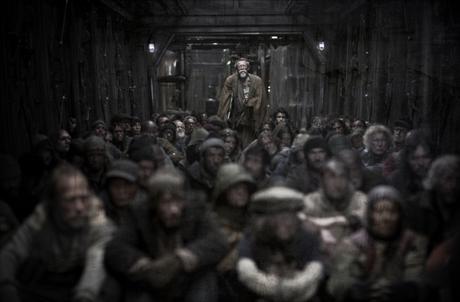
The option we have is to face the present—not understood as a empty space, but as a real stage where things are alive and becoming. We need emancipation now!
Our present is neutralized by capital. It has become very dull. Repetitive things that come again and again without meaning. For example, imagine the lives of all the working people. The first thing they think in the morning is, 'I don't want to go to work.' At least, from the viewpoint of office workers in Seoul.
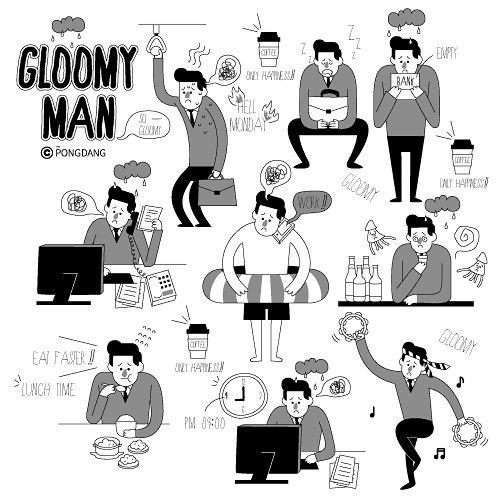
The notion of abstract labour does not take into account reproductive labour, slavery, and the exploitation of raw materials. So, how do we arrive at a different notion of time today? What can we still learn from the '68 movements, from the past of social and political struggle?
Federica Bueti
The Present of Our Here and Now
May 20, 2017 — 12:07
Maurizio Lazzarato argues against the future and for thinking in the present.
In his talk, Italian Post-Operatist thinker Maurizio Lazzarato discusses what he considers the Accelerationist's problematic approach to the idea of future. Then, he continues by arguing against a modern idea of future as a linear progression. Why are we obsessed with the future, of progress and betterment? To a thinking of the future, Lazzarato opposes Michael Foucault's and Italian feminist Carla Lonzi's emphasis on the necessity of thinking and acting in the present. Lazzarato suggests that feminist and post-colonial discourse have provided us with important theoretical tools and forms of resistance rooted the need to think the present condition. What can we still learn from the movements of '68?
Lazzarato quotes Lonzi's Let's Spit on Hegel (a highly recommened reading) on her critique of linear time, historical progression and the future. Against an idea of future as progress, Lonzi emphasized the need to focus on the present, the time of women. As she writes, 'there are no goals, there is the present of our here and now. We are the world’s dark past, we are giving shape to the present.'
Lazzarato insists on the need to be and work on the here and now. But, if the present is to be imagined as multiple temporalities, what is the here and now Lazzarato is speaking of?
Federica Bueti
The Labour of the Future, Speculative Practices, Afro-Futures
May 20, 2017 — 10:54
Becoming More day two, Future Caucus, is convened by Sven Lütticken and Eric de Bruyn
'Taking cues from the work of paradoxical modernists and Afro-futurist scenarios, the "future caucus" is convened to address what can be learned from past and present imaginings of futurity – social, cultural and otherwise – as we slide deeper into the capitolocene.'
This second day of Becoming More opens with a lecture by McKenzie Wark titled Paradoxical Modernism [–9088a

Agata Cieslak
Is Birmingham on Mars?
May 20, 2017 — 09:58
I'm Not Your Negro is a documentary directed by Raoul Peck, andbased on James Baldwin's unfinished manuscript Remember This House. The documentary is a kind of assemblage of stories, songs, movies and memories bringing together an image of the history of black resistance in America. Within my response, I try to keep the same feeling and approach. All the materials presented here, lyrics of the film's songs and comments are loosely connected to the documentary's narration.
The story is linear. History repeats itself. The writers of this story keep making the same mistakes. History is not past. Stories are designed to produce legends.
They says if you was white, should be all right;
If you was brown, stick around;
But as you's black, m-mm brother, git back git back git back...
Ms. Miller was a good teacher. She was telling stories about the World. She showed where Ethiopia and Italy are. She also told stories about the Third Reich.
Raise up, get yourself together
And drive your funky soul
Raise up, get yourself together
And drive that funky soul
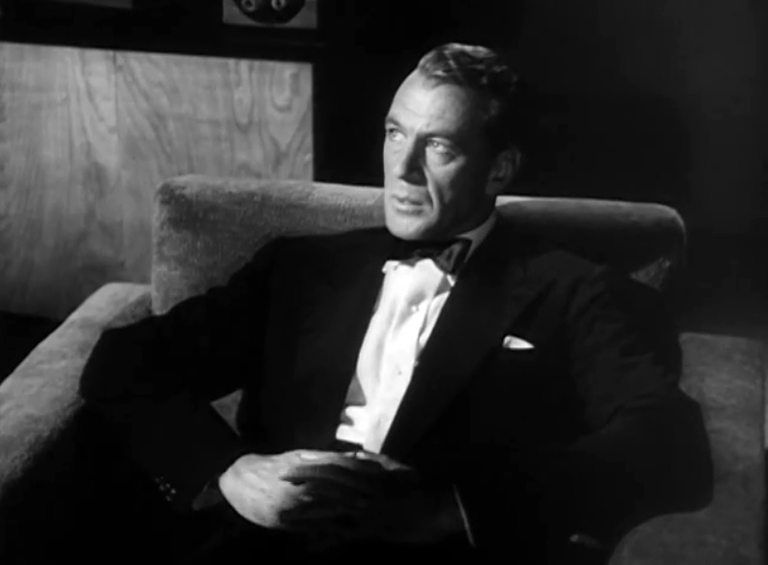
Don't know why
There's no sun up in the sky
Stormy weather
Since my man and I ain't together
Keeps rainin' all the time
Get your body moving, move your f-king soul...
Love is something strong. Love is a direct action.
Cryin', sun gonna shine in my back door someday
Now, don't you hear me talkin', pretty mama?
Lord, sun gon' shine in my back door someday
And the wind gon' change, gon' blow my blues away.
_1.jpg)
White people have managed to go through life in a euphoric state. Black people were never able to do that. To take a route means returning to the South.
If you never plan to take a moral West ...
It winds from Chicago to LA,
More than two thousand miles all the way.
Get your kicks on Route sixty-six.
Why do we focus on colour and not on the other things that connect us?
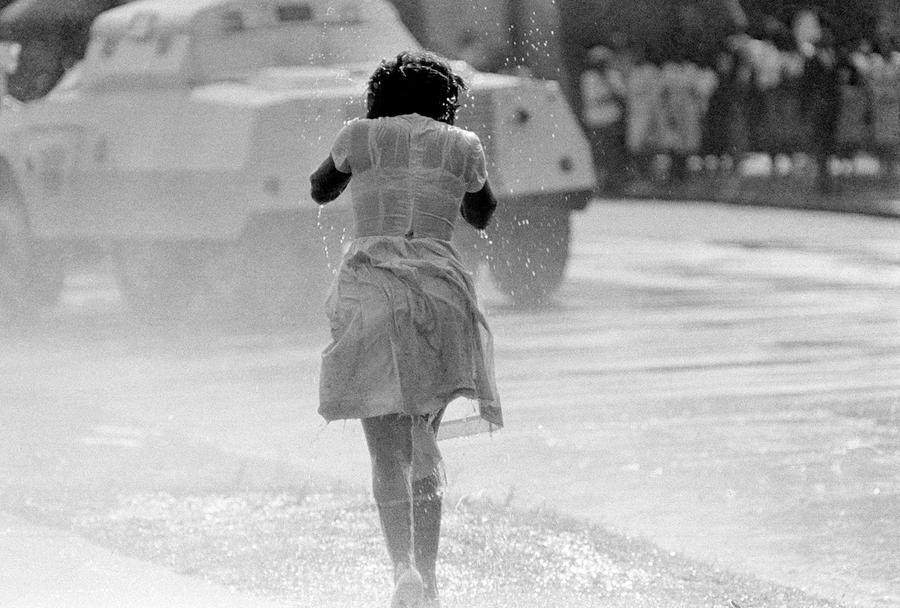
She felt way safer walking the streets alone than walking them together. I'm Chiquita Banana and I've come to say – I offer good nutrition in a simple way – when you eat a Chiquita you've done your part...
People in general cannot bear much reality. Reality was built on a lie. The lie that humanity exists. I can't be a pessimist because I'm alive.
... that was just a dream, Lord, what a dream I had on my mind!
Now, and when I woke up, baby, not a chair there could I find...
Not everything in a face can be changed. But nothing can be changed until it is being faced.
Federica Bueti
Nothing Can Be Changed without Being Faced
May 20, 2017 — 09:55
'Nothing can be changed without being faced.' James Baldwin's words concisely and pointedly summarize the first day of conversations, talks and interventions.
Becoming More DAY one closed with a screening of I Am Not Your Negro, a documentary by Raoul Peck on James Baldwin's life and deeds. At one point in the movie, Balwdin addresses what scholar Gloria Wekker, in her keynote lecture on the inaugural night of Becoming More, had described as 'white innocence' or white people's passionate denial of racial discrimination and colonial violence. Wekker referred to the specific Dutch context, but the analysis could be extended to include other European colonial powers. White innonence refers to the problem of self-representation and self-understanding that seem to prevent white people from engaging with their colonial histories and with the long history of racism.
I Am Not Your Negro is based on Baldwin's unfinished manuscript Remember This House. Through Baldwin's personal observations of American history and his personal account of the civil rights leaders Medgar Evers, Malcolm X and Martin Luther King, Jr., the film addresses racial violence and social oppression in the USA. The film summerize amany of the concerns that have been addressed by speakers during the day. From the personal account of their involvement in the Suriname struggle in the Netherlands by Ernestine Comvalius and Andre Reeder to Paul Goodwin's reflections on art institutions and the undercommons, to the thought-provoking presentation by Simone Zeefuik, who addressed the racial structure that organizes discourse within art institutions such as museums, the different presentations seem to converge around two main issues: the question of knowledge production. for instance, how the existing black archive of anti-racist struggle and resistance can not only be preserved, but more importantly shared and actualized in this phase of black struggle in the Netherlands and around the world; the other question concerns institutional politics. How do black people situate themselves within a white institutional environment? What is the role of the black intellectual? How can we change the framework of predominantly white institutions? The presentations by Goodwin and Zeefuik brilliantly addressed the problem of knowledge production, self-representation, and institutional politics. Goodwin attacked the idea of 'diversity' that seems to dominate art institution's agendas, and called for the right to opacity, which, Goodwin observed, translates into the right not to be incorporated into existing discourses and institutional frameworks. Opacity, he remarks points to a world that cannot be systematized; a world in which people do not have to conform to certain ideas of normalcy. Through opacity knowledge is approached from the viewpoint of differences. In a similar vein, Zeefuik pointed to some blind-spots in the way art institutions represent themselves to themselves and to the outside, the kind of stories they tell. She called on museums such as the Van Abbe to attend to their responsibilities, to questions of discrimination, and to make a bigger effort to be listen, be aware and change the discursive and structural framework of the white museum. What kind of stories do we tell ourselves and to others? The presentations of this first day of Becoming More addressed a clear message to the world: 'Dear white people, nothing can be changed without being faced.'
Maya Watanabe
#RewriteTheInstitute - Simone Zeefuik
May 19, 2017 — 17:49
#SimoneZeefuikGivesAThoughtProvokingTalkOnTheStateOfArtInstitutionsInTheNetherlands
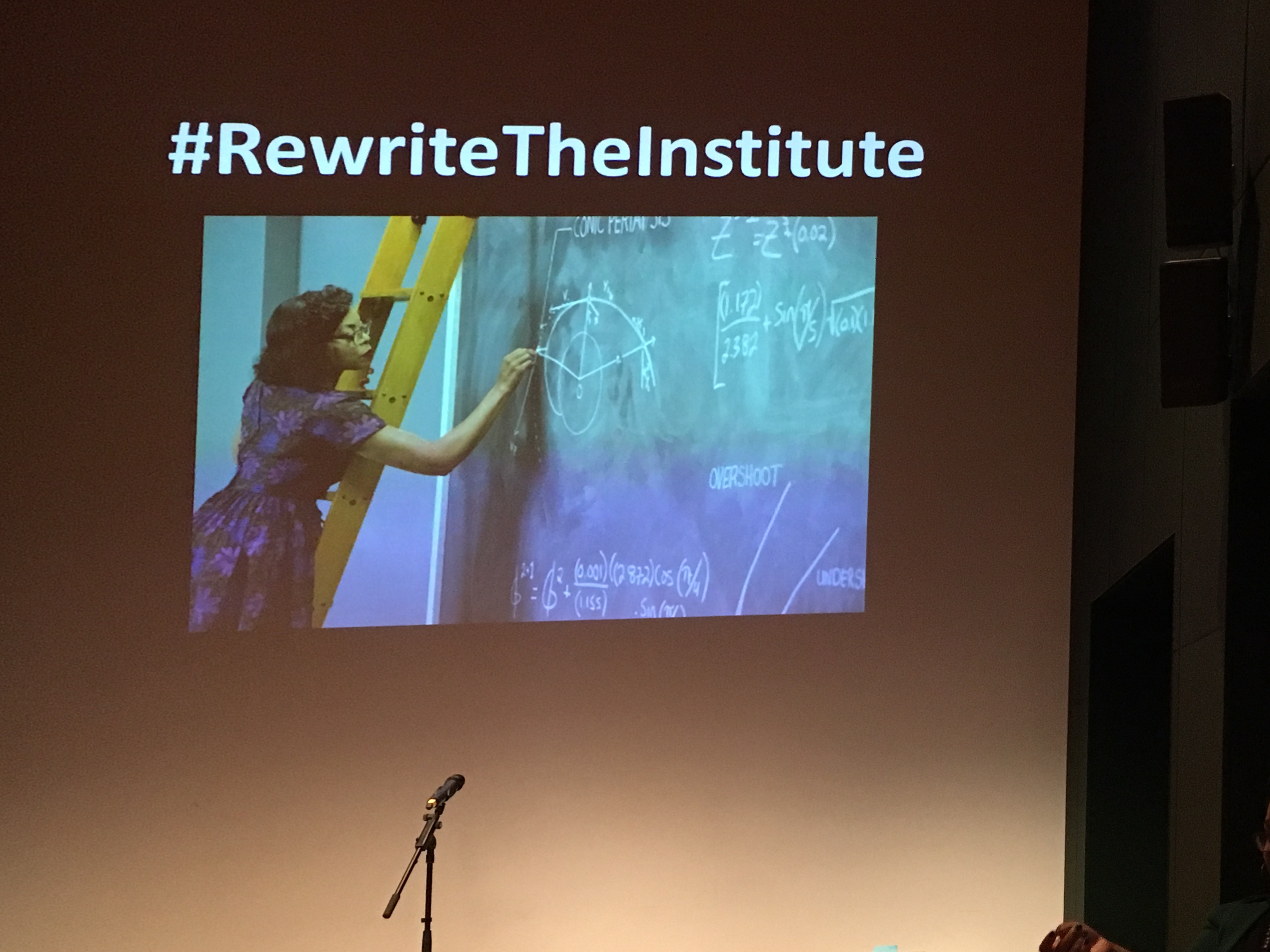
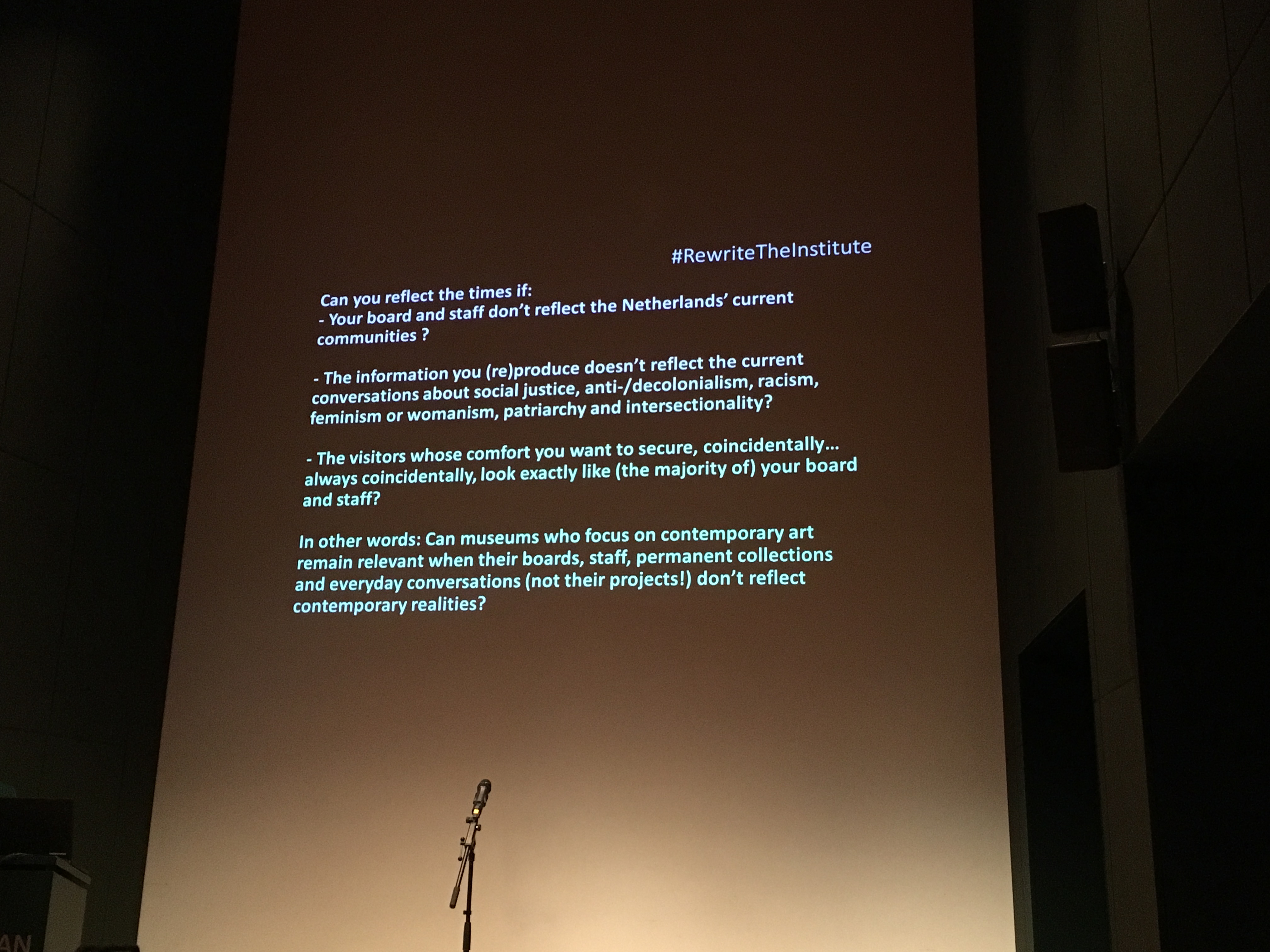
#HowCanYouBeAnArtistAndNotReflectOurTimes?
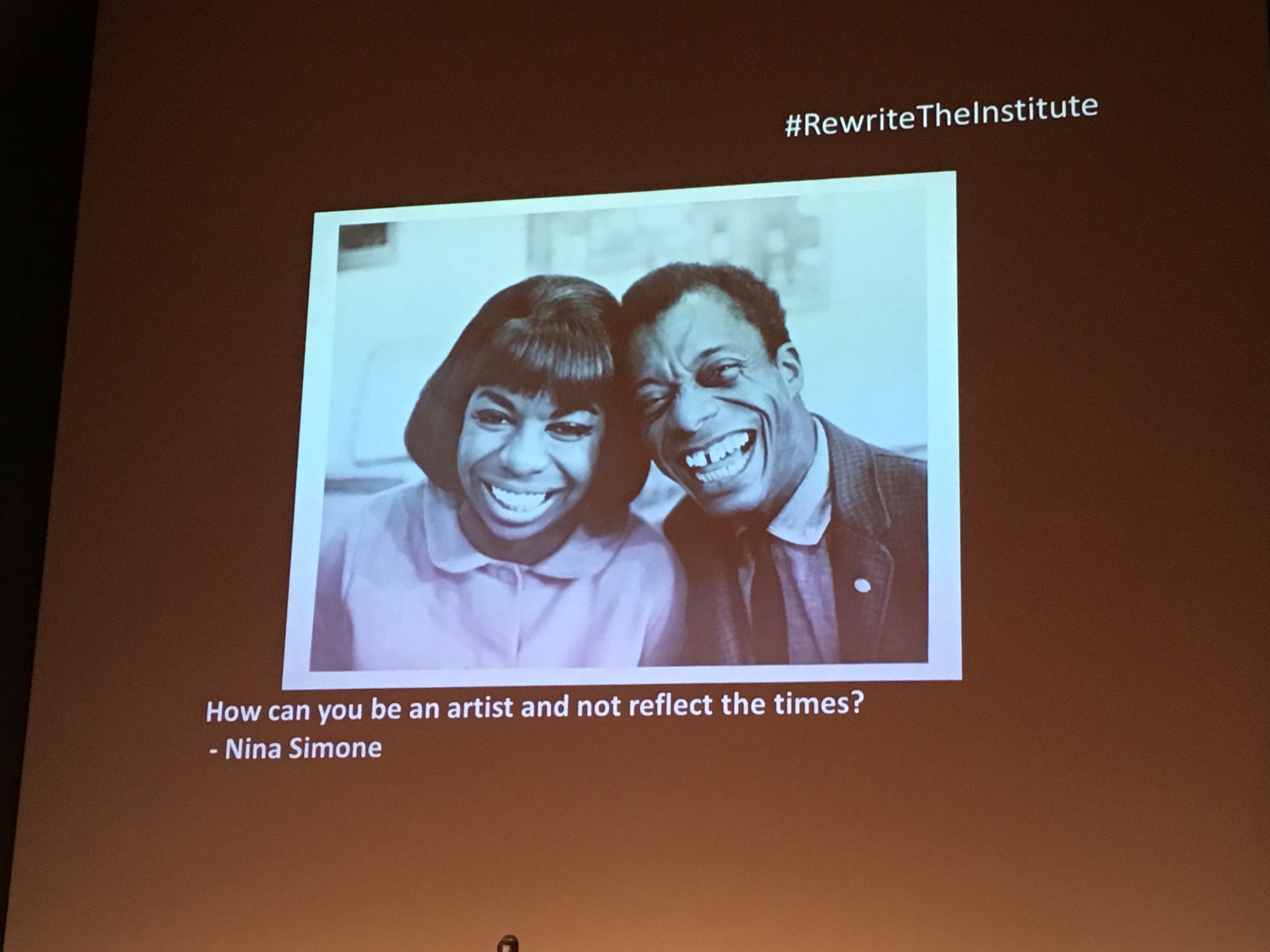
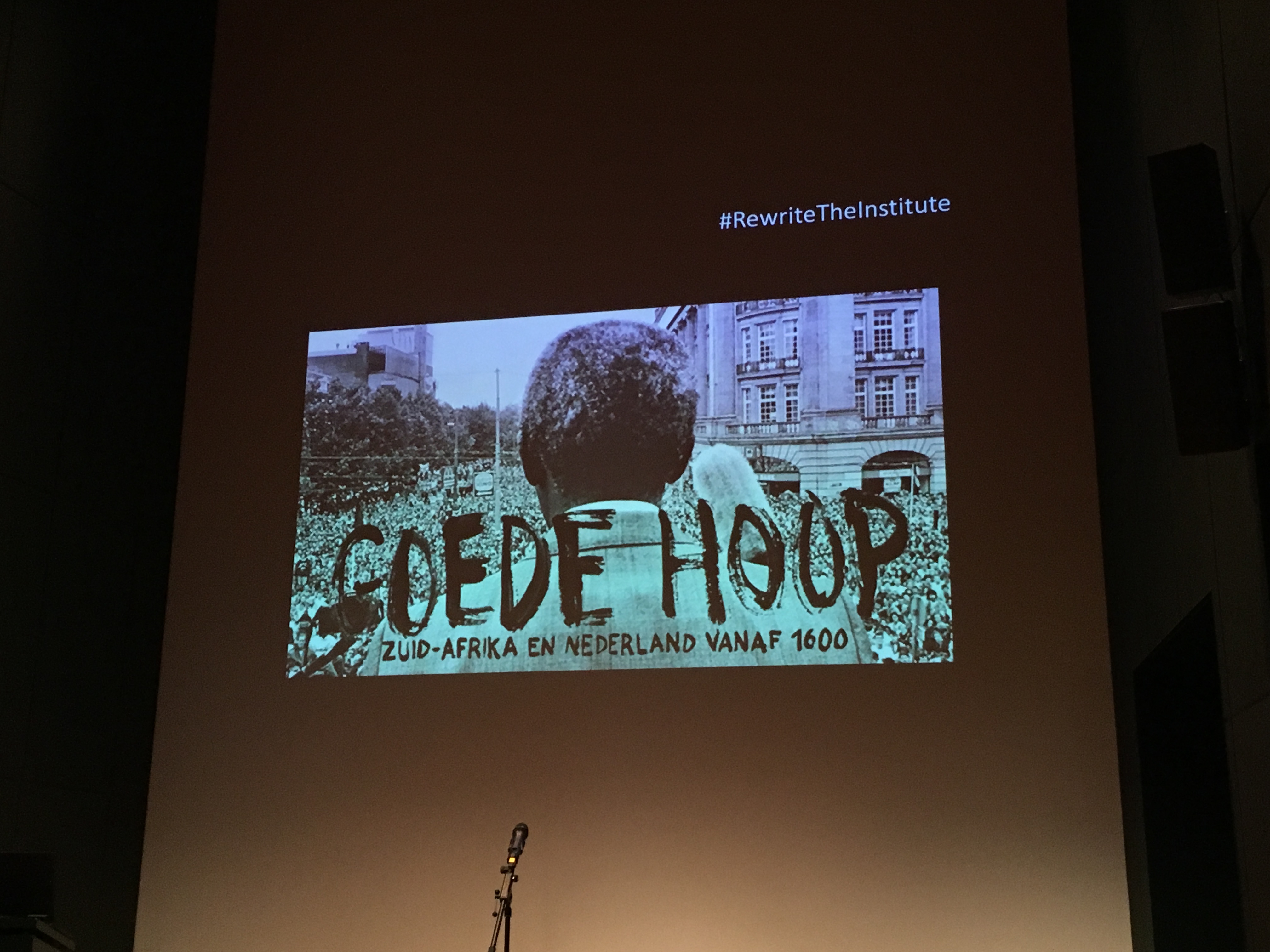
#ChangeYourStaffAndChangeYourBoard
so
#HowDoYouStillBeRelevantAsAnInstitutionIfYouKeepTheDominantNarratives?
Mónica Chaminé Lacerda and Wilfred Vlad Tomescu
Paul Goodwin: Diversity as a Monster
May 19, 2017 — 17:38
Mónica Chaminé Lacerda and Wilfred Vlad Tomescu engage in a poetic conversation on the issues raised by Paul Goodwin in his inspiring talk
“Recalcitrant (adj.) resisting a call to order / discipline that institutions are imposing on us
refusing to comply to the rules and regulations and the way authority wants us to behave.”
— Paul Goodwin
Mónica Chaminé Lacerda: These are my notes. Can’t do any better.
relevance of history and memory to contemporary life;
african influences on modernism;
gender and sexual identities;
images and objects and how do they circulate;
local knowledge and local art;
to engage with the works and work on their positions (public);
search for more self-reflexive curatorial practice / engagement;
to develop a more recalcitrant posture;
market / nationalist pressure / narratives to have tactics of recalcitrant (?);
to be assimilated by the museum (diversity as a monster);
opening up to a more rigorous intellectual agenda;
to have multiple languages;
the right to be opaque;
“There’s a basic injustice in the worldwide spread of the transparency and projection of Western thought. Why must we evaluate people on the scale of transparency of the ideas proposed by the West? … I said that as far as I m concerned, a person has the right to be opaque. That doesn't stop me from liking that person, it doesn’t stop me from working with them, hanging out with them, etc. A racist is someone who refuses what he doesn't understand. I can accept what I don’t understand. Opacity is a right we must have.”
— Edouard Glissant, The Right to Opacity
Wilfred Vlad Tomescu: Thank you, these are mine… hands and brain disconnected...
what is the undercommons of the museum?
and if there is none how can we create one?
there is no binary mode to the undercommons (in / out)
it is a mindset, a position in relation to power / refusal, opacity / supporting and extending black sociality – a way of being in common for each other, eating, drinking, fucking;
it already exists and we are doing some of that work, but we need to extend it and expand its message and power;
- a refusal and position of fugitivity; a call to power
- undercommons: practice of recalcitration
“The only possible relationship to the museum today is a criminal one.”
— Fred Moten and Stefano Harney, The Undercommons: Fugitive Planning & Black Study
//
W: How do we navigate working in predominantly white institutions?
M: We need to think about the experiences we have and choices we make as practitioners. Raced sexed and gendered subjects working in mainly white institutions. How to think this dialogue between people of colour living and struggling in a white supremacist context?
W: If one is inside an institution does that also make them of the institution? How to be simultaneously Inside and outside, where the activism happens forcing the institution to unsettle. How do we operate the space into which artists of colour are absent?
M: How do we create new spaces to show black and non-Western artists?
Federica Bueti
How Much Do We Know about Each Other?
May 19, 2017 — 17:13
A conversation between Paul Goodwin and Wayne Modest
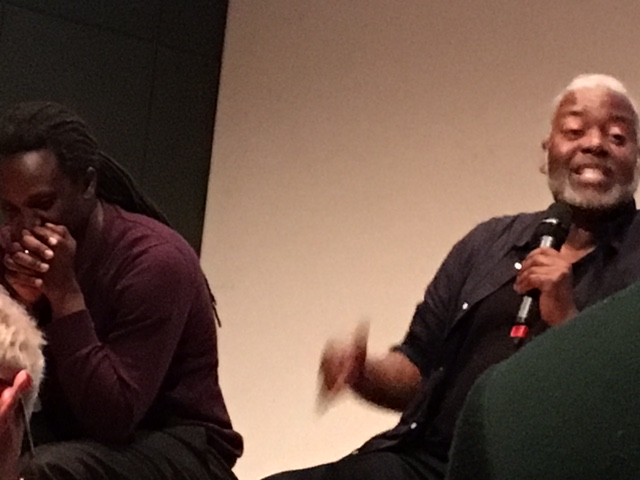
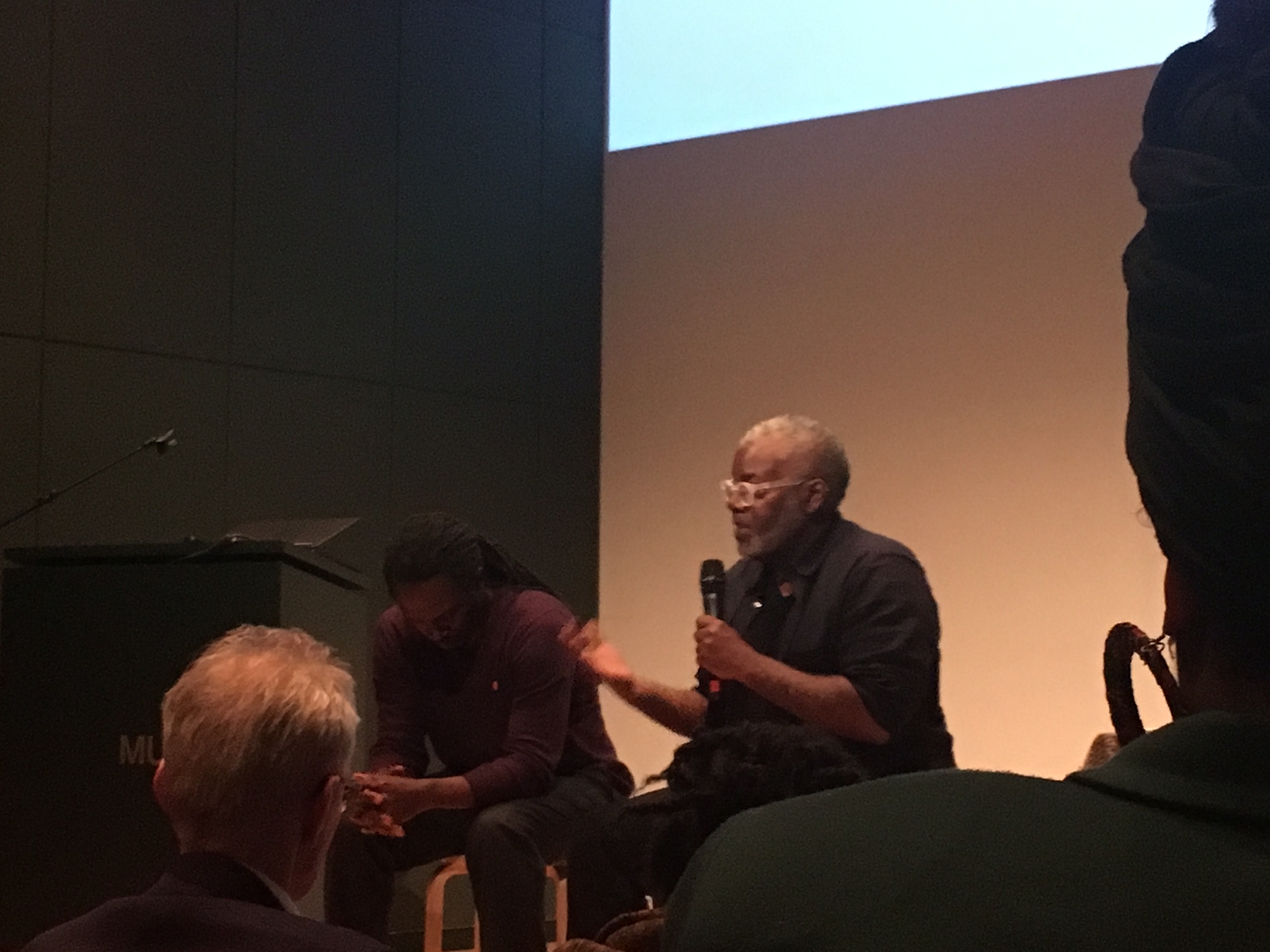
A few quotes from Paul Goodwin's presentation:
'We need to speak multiple languages to different audiences to dismantle existing hierarchies.'
'What kind of knowledges are we building when we are working across borders? How much do we know about each other?'
'We, black people, are and work in institutions, but we are not of them.'
Mónica Chaminé Lacerda and Wilfred Vlad Tomescu
Karin Amatmoekrim: Migrants, Modern People of the Postmodern
May 19, 2017 — 16:32
Mónica Chaminé Lacerda and Wilfred Vlad Tomescu engage in a poetic conversation on the issues raised by Karin Amatmoekrim’s talk
Mónica Chaminé Lacerda
'the modern identity of these people in the West has become fragmented'
one asks: on whom has fragmentation had a stronger impact?
migrant potency
identity and origin
civilization and identity
how to turn this into a poem?
intimacy that suffocates
a loneliness that grows and roots
what lives under the skin under the flame of hope that one clings on to?
the language that one learns eventually annihilating one's mother tongue
how to create a place of tolerance
where the mind is not trapped in a niche
alcoholism
that inhabits a rupture
that can’t be filled despite
the attempts
(i love to listen to the interpreter's breathing in my ears)
****
Wilfred Vlad Tomescu
i wonder if there is a clue
to the issues discussed in
the caucus so far in the
parallel /
/ translation
necessary for those who do
not understand
Dutch
a Dutch voice is overdubbed
by a British voice interpreting
the words used by the former
occasionally breaking the fourth
wall
to announce that there is static
on the line and the words cannot
be heard
the questions that come from the
interpreter addressed to the
sound technician to check whether
or not they can be heard
*breathing in headphones*
these moments break my attention
and make me intuitively think
about language and the language of
differences the assumptions i am
making about the identity or
race of the person in my ears
(disembodied voice)
how they are acting out what they hear
wondering how and for whom they were
chosen or why the lecture itself was
chosen to be read in Dutch since the
question asked at the very end by a
*breaking in headphones*
member of the audience is responded to
in English by the same presenter
with a clarity and pace that is easier
for me to follow as well as to connect
to the presence, facial expressions
and gesticulation of the un-interfaced
speaker (voiceless body) but mostly
*inaudible*
i think of being told that last night
i shouted ‘get out of my way’ or ‘get
off of me’, in my sleep
but i shouted in English and that is
not my identity
Federica Bueti
Existing On Other Terms
May 19, 2017 — 16:11
Justice or Just This?
'We ask for justice and what we get is just this.' (a member of Becoming More)